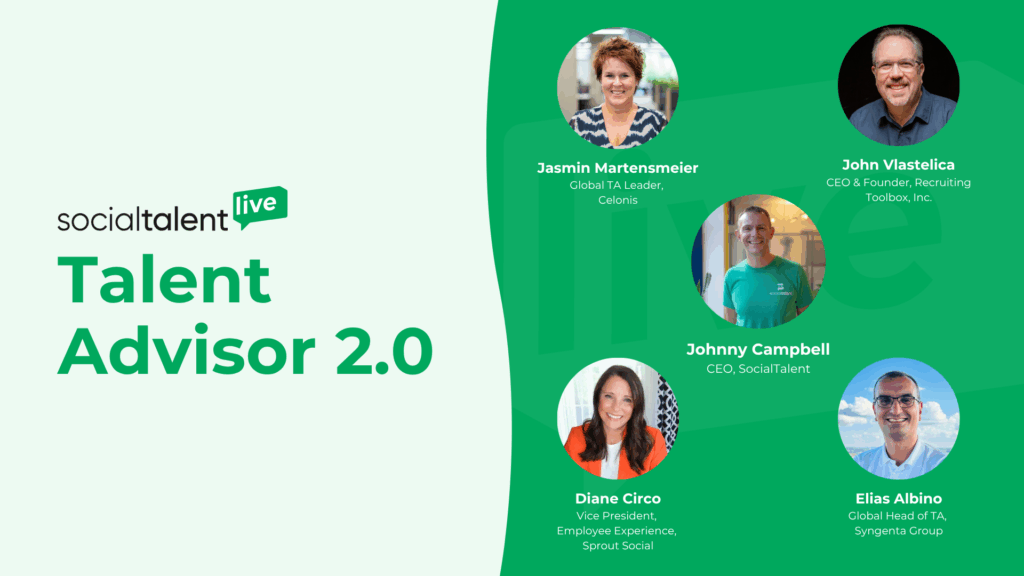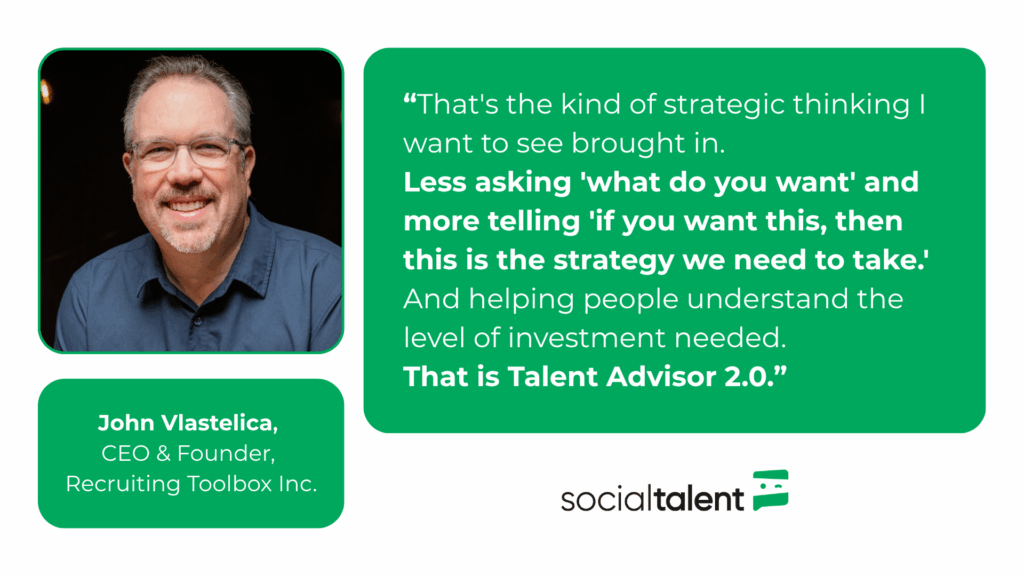Talent Advisor 2.0: Key Insights from SocialTalent Live
Recruitment is undergoing a radical transformation. With the rise of AI and automation, the traditional role of the recruiter is being reshaped – and fast. As businesses demand more strategic alignment, recruiters are being called to step beyond admin and operations to become true Talent Advisors. But what does that transition really look like in practice?
This was the driving question behind SocialTalent Live: Talent Advisor 2.0, our latest virtual event, where global talent leaders came together to unpack how recruiters can evolve into influential business partners – and why this shift is more critical than ever.
Being a Talent Advisor is more than a title change – it’s a mindset shift. It’s about having the strategic thinking, data literacy, and consultative skills to influence hiring decisions and shape organizational success. Throughout the event, our expert speakers shared candid insights, practical strategies, and real-world examples of how this transformation is taking root across industries.
Hosted by Johnny Campbell, CEO of SocialTalent, the event featured rich conversations with some of the leading voices in talent acquisition today:
- John Vlastelica, CEO & Founder, Recruiting Toolbox
- Elias Albino, Global Head of Talent Acquisition, Syngenta Group
- Diane Circo, VP Employee Experience, Sprout Social
- Jasmin Martensmeier, Global Talent Acquisition Leader, Celonis
Below, we’ll dive into the standout themes and actionable takeaways from each session – giving you the tools and inspiration to move from recruiter to Talent Advisor.
– Watch the full event HERE –

1. Evolving into a Talent Advisor – Influence, Strategy, and Data in Action
Key theme: The definition of a strong talent advisor and early signs of moving towards more strategic influence.
The first panel of SocialTalent Live: Talent Advisor 2.0 brought together a dynamic trio of talent leaders: Elias Albino(Global Head of TA, Syngenta Group), Diane Circo (VP Employee Experience, Sprout Social), and Jasmin Martensmeier (Global Talent Acquisition Leader, Celonis). Together, they explored what it truly means to become a Talent Advisor – and how this evolution is playing out inside some of the world’s most progressive TA teams.
Influence Is the Currency of Partnership
Elias Albino opened the conversation by challenging the idea that titles or org charts can define influence. Having transitioned back into TA after a decade as an HR business partner, he emphasized that what makes someone a true advisor isn’t structure – it’s impact.
“The title doesn’t make you a partner. The organizational structure doesn’t make you a partner. Influence makes you a partner.”
But influence, Elias noted, is contextual. To earn it, recruiters need a deep understanding of both the business and the unique value each stakeholder expects from TA. That requires capability and capacity.
“You cannot be an influential partner if you do not have time to be an influential partner.”
Changing Culture, One RAM at a Time
Diane Circo shared how Sprout Social embraced the Talent Advisor mindset as a cultural shift, not just a skills upgrade. Using SocialTalent’s Talent Advisor learning path, her team revamped the traditional intake meeting into what they now call “role alignment meetings” – or RAMs.
“Rather than asking hiring managers if they want fries with that, we’re using this time to get really clear on what success actually looks like in the role. We’re bringing in the trade off triangle into the conversation. We’re asking sharper questions, and we’re building that trust and credibility from the start.”
The impact has been dramatic. In just one year, Sprout cleared a two-year backlog of roles, hit 96% of hiring targets, and improved offer acceptance – all by building trust through alignment and strategic partnership.
“Now today, we have a much better seat at the table, and we have this wonderful momentum that’s gonna power us to the next chapter of our evolution.”
Data as a Strategic Lever
For Jasmin Martensmeier, becoming a Talent Advisor means leading with insights. At Celonis, where data is part of the company’s DNA, her team uses workforce intelligence to shape everything from hub strategy to talent pipeline design.
“We’ve by far bypassed the era of ‘it’s all about time to fill.’”
Instead, her team is focused on sustainability – using data to influence long-term decisions about where to hire, what mix of talent to target, and how to grow skills internally through programs like graduate pipelines and early-career development.
“We wanna be really strategic… benchmarking from a peer company perspective, asking: are we being competitive enough, and are we hiring where it makes sense?”
Building the Future with Intention
Across all three speakers, one theme stood out: the shift to Talent Advisor can’t happen without intentional design – of processes, relationships, and time. That includes leaning into AI and automation to free recruiters from admin and enable more strategic work.
As Diane put it:
“AI is helping us hire faster, and so now this is our chance to help our companies hire smarter.”
Her team is currently overhauling assessments to ensure every hiring decision is contextual, aligned, and sustainable. Jasmin echoed the need for more recruiter touchpoints, and Elias reminded attendees that not everyone wants the Talent Advisor role – and that’s okay.
“This talent advisor thing is nice, is sexy, and everything, but is that what you want? Because it’s a very different set of skills.”
Together, this panel laid the foundation for what TA 2.0 looks like: not a rebrand, but a reinvention – powered by trust, driven by data, and rooted in real business value.

2. Defining Talent Advisor 2.0: Vision and Roadmap
Key theme: The evolution of the talent advisor role and what the next generation of TA leaders look like.
If the first panel showed what becoming a Talent Advisor looks like inside organizations, the second dove into why it’s happening – and what’s next. In a wide-ranging conversation between John Vlastelica (CEO, Recruiting Toolbox) and Johnny Campbell (CEO, SocialTalent), the focus turned to the shifting demands reshaping the recruiter role and why 2025 may be a turning point for the profession.
Why Talent Advisor, and Why Now?
The concept of recruiters becoming more strategic has been around for decades. As John pointed out, companies have long wanted to move beyond order-taking and into consultative partnership.
“That seat at the table thing that started in the 1990s is still being talked about.”
So what’s new? Why is Talent Advisor 2.0 now becoming a priority?
According to John, the answer lies in a convergence of factors: AI automation, economic pressure, and organizational scrutiny. Recruiters are no longer being asked to simply fill roles – they’re being pushed to justify their existence. And it’s not just about becoming better advisors for its own sake. As Johnny noted:
“We’re not really doing it so that recruiters can become better Talent Advisors. We’re doing it because the business needs it.”
Efficiency Is the Trap – Influence Is the Escape
One of the biggest challenges, John warned, is what Gartner calls the efficiency trap. Under pressure to deliver more with less, teams cut recruiters – and in doing so, strip away the very space required for strategic work.
“They cut recruiting. And guess what? When you cut recruiting and overload recruiters with high reqs, it just makes it easier to say, what is recruiting even? What value do they add?”
In a world where AI can surface best practices instantly, the value of recruiters won’t lie in knowing what to do – it will lie in knowing how to guide, influence, and drive real change.
“The things that are left are gonna be the very human relationship, trust-building, credibility-needed kind of influencing, guiding, teachable moment conversations.”
What’s Left When the Bots Take the Admin?
John and Johnny explored a provocative idea: What if recruiters had no laptops? What if their only job was to talk to people?
But it’s not so outlandish. In fact, in this Talent Advisor 2.0 era, it’s an emerging reality. As Johnny framed it, we may be entering a “Mad Men” phase of recruiting, where AI is the secretary pool and the recruiter becomes a high-level conversationalist and strategist.
In that world, the core skill isn’t speed. It’s judgment. And influence. Even negotiation. And as John emphasized, it’s knowing how to tie business goals to talent decisions – whether it’s guiding comp conversations, shaping hiring bar definitions, or redesigning roles to meet business needs, something Diane also mentioned in her panel.
Talent Advisor 2.0: Three Career Paths Are Emerging
Looking ahead, John mapped out three likely evolution paths for recruiters who want to stay in the game:
- The Holistic Talent Partner
Moving beyond hiring to influence skills needed, internal mobility, and organizational design. - The Scaled Strategic Recruiter
Managing large req portfolios powered by AI and focused on diagnostics and workforce planning. - The TA Specialist
Owning areas like assessment, onboarding, fraud detection, or quality of hire programs.
Each requires a new level of business acumen, influencing skill, and diagnostic thinking – especially in conversations with hiring managers, HR, and executives.
A New Definition of Success
For recruiters to thrive, companies need to evolve not just titles, but mindsets. That includes rethinking KPIs. Johnny recalled a conversation where the business’s only measure of recruiting success was cost per hire:
“That’s not very aligned to Talent Advisor-type thinking.”
Instead, teams should connect Talent Advisor outcomes to value creation: better negotiations, smarter org design, lower attrition, and more strategic hiring. And to do that well, as John put it:
“One of the biggest opportunities for Talent Advisor 2.0 is to be good at translating what’s going on in the business… into talent implications.”
Closing Thought: Ready, Aim, Fire
In a world rushing to plug AI into broken processes, John offered a word of caution:
“We need to do a lot more aiming. There’s a high risk right now of taking a pretty crappy process, throwing AI on it, and just automating bad practices.”
Talent Advisor 2.0 isn’t about being a better recruiter. It’s about becoming a business-critical partner – someone who understands the system, connects the dots, and designs for success.
Conclusion
Talent Advisor 2.0 isn’t a buzzword – it’s a necessary evolution. As AI strips away the transactional layers of recruiting, what remains is the human heart of talent acquisition: influence, insight, and strategic partnership.
Across both panels, our speakers made it clear – the future of TA belongs to those who can think like business leaders, communicate like consultants, and act like organizational architects. Whether it’s aligning with hiring managers, redesigning roles, or using data to shape strategy, the role of the recruiter is expanding – and so is its impact.
The question isn’t whether your team needs to become Talent Advisors. It’s whether you’re creating the capacity, culture, and capability to make it happen.
Because ready or not, the evolution is already underway.


